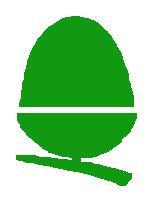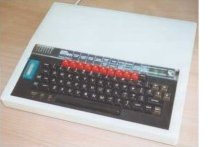

The story of the BBC computer started in 1981, around the time when the first home computers were being produced.
The BBC got involved in the computer literacy project, aimed at increasing the public awareness of computers, and this had evolved from a BBC documentary called The mighty micro which discussed the coming microcomputer revolution and its impact upon life, industry and the economy.
The BBC decided that it needed it's computer to be able to perform certain tasks, most of which they would demonstrate in their new TV show, The computer programme. These tasks included programming, graphics, sound and music, and controlling external hardware. This was quite a complex list in those early days of computers, and the BBC issued a challenge to British computer manufacturers to produce what was required.
Acorn computers, of Cambridge, believed that they could produce what was required. They produced the Acorn Proton, an upgrade to the Acorn Atom, that they had already produced. which was clearly better than any of the other computers that were offered to the BBC, including the Grundy NewBrain computer and Dragon computers.
It is rumored that the BBC originally rejected the Proton, claiming that it did not portray the modern computer age correctly. Acorn countered this by submitting the Proton again, this time with the function keys painted a bright orange, and no other changes. It was accepted :-)
Acorn computers was given the right to market their computers with the BBC brand and the computer literacy logo (The owl logo on this website) and the Proton was released to the public as the BBC model A computer 1982, selling at a cost of £235. The model B followed not far behind, with enhancements including extra RAM and better graphics, selling at £335.
The BBC model B was (in the UK, at least) a big success. It was expected that around 12,000 units would sell, but it was eventually around 1 million. This success had a lot to with its use as an educational computer. It was widely used in schools for educational purposes (although if was anything like my school, you got 10 minutes on it, before it became someone else's turn :-( and therefore never finished anything you started.) and a lot of programs were written as educational software, as well as programs to interface with external machines and even to run science experiments and musical keyboards.
If you want to have a look at the features of the Beeb (or any of the other Acorn computers discussed below), have a look at The history page of "The BBC lives" website.
There were all types of educational games produced including simple ones like Podd, where you have to get a tomato like creature to do activities. There were approx 100 things pod could do, including walk, jump and clap, and despite trying to find them all, the entire class at school couldn't get more than about 40 or 50 of them. Then there were more complex ones, full of puzzles you have to solve, including the much loved (and I believe, possibly still used today), Granny's Garden.
As well as an educational computer, many classic games were produced for the Beeb including, Elite, and Chuckie Egg Despite the low (compared to today's computers) amount of memory these computers had, or perhaps because of it, these games are some of the best ever made. They are simple and easy to learn, fun, addictive and not cluttered by high levels of sound or graphics.
Since the BBC model B was quite expensive, Acorn also released the Electron (this did not feature the BBC brand name) which was a simplified and cheaper computer suitable for the home market. It did reasonably well for itself but by this time, other manufacturers were getting into the home computing market, the most notable other home computer being the Sinclair ZX Spectrum (and quite a few people, including myself, had already got a Beeb)
As technology improved, and the BBC model B fell behind, Acorn produced the Model B+ and the Master series of computers but software companies never really took advantage of these improvements. The Master Series had a feature that schools had been begging Acorn for - a little screw by the side of the BREAK key that disabled it!
In 1987 Acorn released the Archimedes computer. At the time it was one of the most powerful computers around. Unfortunately, it did not make the same impact as the Beeb computers, (although it did have the BBC logo again). It was based on the RISC (ARM Reduced Instruction Set Chip) porocessor, which was faster than other computers of the time and which Acorn had been developing for the previous 4 years. It really only found a market in the education sector and this was partly due to the "computers for schools" scheme which was developed by Tesco in association with Acorn. One of the major problems was that for a long while, most of the Beeb games did not run on the Archimedes which reduced it's appeal for the home computer market. Also it was competing with the Amiga, which was cheaper and appealed more to home users. Also, in the early 1990's, Microsoft Windows was just coming onto the market.
Acorn stayed in the computer market until 1998 (for further details see A technical history of Acorn Computers), and some software companies, like Superior, Tynesoft and Audiogenic remained loyal to the Beeb and Electron computers right through to the early ninties, with games like Klax. But by the mid nineties, the software for the Beeb's had dried up and most of the Beebs from schools had been confined to the skip, indeed most schools were getting rid of their Archimedes computers and getting in PCs instead. So that was the end of an era then.... or was it?
more to come when I get round to it
For a history of computers, have a look at The History of Computers in my Lifetime: 1980's. Dissapointingly, the Beeb is not covered, although the Archimedes is, and it gives some interesting background of other computer developments through the 70's, 80's and 90's.
